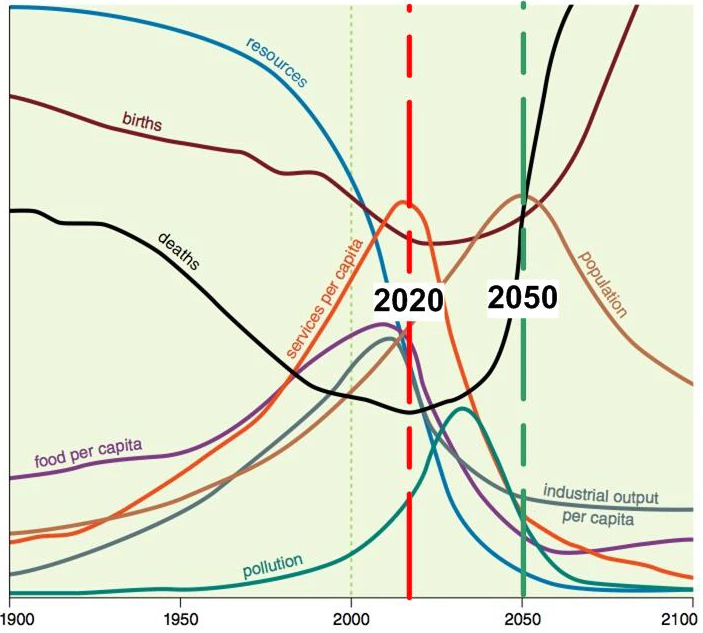So, there’s constant talk about the problem of declining birth rates and how much of a problem they are. There’s some truth to this, but a lot of it is based on the argument that more people lead to growing economies and that argument is terrible. The part that is reasonable is the rising increase in infertility, including plummeting sperm counts. That’s not bad because it leads to less children, precisely, it’s because it indicates how badly we’ve poisoned ourselves.
But the simple fact of the matter is that the world is well past its carrying capacity for the type of society we have. The Club of Rome predictions from 1968 have almost all tracked the real world, and we’re just past the hump: we’re into decline, but barely.

Notice that population decline happens about 30 years after the peak of food, industrial and services per capita. That’s bad and it’s part of what is going to make this so ugly. Check out the food per capita line for some real ugliness, though there’s going to be a lot less fat people.
Note that carrying capacity is not purely about population. Different global societies have different carrying capacities per capita. If we had not gone with planned obsolescence (there was a fight over near the end of the 19th century, managers vs. engineers and the engineers lost); if we did not have suburbs and exurbs but only urban, rural and wilderness; and if we had seriously started our transition from fossil fuels in the 80s instead of electing Thatcher and Reagan, our carrying cost would be much less and the world could support a much higher population. But under current circumstances, the world maximum population is probably about two billion, and once climate change runs amok it will be less.
So our population is going to reduce. It’s not “we have to reduce our population” it is “we are animals who exceeded the carrying capacity of our environment and our population IS going to drop, whether we like it or not.” That’s going to suck.
There was a window to avoid this. It is a result of our own decisions: to go with planned obsolescence, to have suburbs and massive numbers of cars, to pollute like maniacs, to destroy the forests and the swamps and the jungles, to not transition away from fossil fuels and dozens of decisions based on greed and “I won’t be here when it gets bad, so who cares?”
As for economies, high dependency rations (fewer working age people supporting people who can’t work) will be a drag. But because we have legitimately already overshot carrying capacity and because of resource and sink constraints (sinks is where we put our pollution, like CO2 and methane) reduced overall population is going to be more good than bad.
How much population will be lost is, in some sense, up to us. We left doing all the right things too late to avoid this, but the faster we transition to societies built around not exceeding planetary limits and working with and for the environment, the less people will die.
But even in a very optimistic scenario I have trouble seeing our population not winding up down two to three billion.
It is what we, as a species, chose through our decisions. That doesn’t mean you or I chose, we mostly didn’t, but at the species level, our decisions lead here.
It is what it is, and it will be what it will be.
The results of the work I do, like this article, are free, but food isn’t, so if you value my work, please DONATE or SUBSCRIBE.